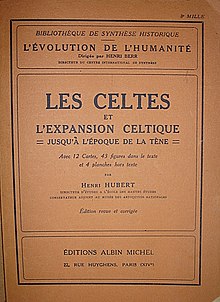Henri Hubert
| Henri Hubert | |
|---|---|

A synthesis which made date. First posthumous edition by Marcel Mauss in the series of Henri Berr
|
|
| Born | 23 June 1872 6th arrondissement of Paris |
| Died | 25 May 1927 (aged 54) Chatou |
| Occupation | Archaeologist Sociologist |
Henri Hubert (23 June 1872 – 25 May 1927) was a French archaeologist and sociologist of comparative religion who is best known for his work on the Celts and his collaboration with Marcel Mauss and other members of the Année Sociologique.
Hubert was born and raised in Paris, where he attended Lycée Louis-le-Grand. There he was influenced by the school chaplain, Abbé Quentin, who instilled in him an interest in religion and in particular in religion amongst Assyrians. He entered the École Normale Supérieure. He began to study the history of Christianity. He passed the agrégation in history in 1895 after studying the Eastern Orthodox Church, the Byzantine Empire, and iconoclasm. His doctoral thesis focused on pre-Christian religion in Asia Minor.
Unlike most French academics, Hubert focused on research rather than teaching after graduation. He took a position at the École Pratique des Hautes Études and in 1898 he also took up a position at the Musée des Antiquités. It was at this time that he grew increasingly interested in Celtic history and culture.
It was also in 1898 that Hubert became a close friend of Marcel Mauss and began collaborating on the Année Sociologique of Émile Durkheim, where he eventually became responsible for the section on the 'sociology of religion'. Hubert and Mauss were to collaborate on several important works in the future, including an "Sacrifice: Its Nature and Function" (1899) and their Outline of a General Theory of Magic (1904).
...
Wikipedia
